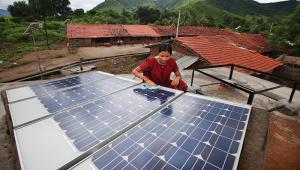By Judith Ugwumadu | 31 March 2014
New approaches to fiscal policy and other economic reforms are needed to encourage governments to pursue measures that will address the consequences of climate change, the United Nations said today.
An Intergovernmental Panel on Climate Change report warned that the effects of climate change were already occurring on all continents and across the oceans. It drew on the views of more than 300 experts, from 70 countries, and concluded that the world was ill prepared for the risks of climate change.
The report examined the impacts of climate change to date, the future risks from a changing climate and the opportunities for effective action to reduce risks, including for action for governments.
Chris Field, co-chair of the IPCC working group that produced the Climate change 2014: impacts, adaptation, and vulnerability report, noted that adaptation – action that helps to manage the consequence of climate change – was now starting to occur.
Adaptation strategies include: public health measures that adapt to increases in climate-enhanced diseases; better building insulation which mitigates energy use and associated greenhouse gas emissions; relocation of infrastructure away from low-lying coastal areas; and the construction of sea walls that protect against sea level rise and at the same time protect against tsunamis.
Field said: ‘Climate-change adaptation is not an exotic agenda that has never been tried. Governments, firms, and communities around the world are building experiences with adaptation.
‘This experience forms a starting point for bolder, more ambitious adaptations that will be important as climate and society continue to change.’
However, the report noted that some adaptation options would simply be too costly or resource intensive or would be cost ineffective. The report argues that adaptation generally needs to be seen in the frame of the overall development path of the country.
It stated: ‘One of the main roles of governments and local authorities is to remove barriers: realigning the incentives of individuals with the goals of society, providing the public goods needed for adaptation, or helping with behavioural and cognitive biases.
‘But governments and local authorities face their own barriers, often referred to as government or regulatory failures.’
The report noted that interest in estimating the costs of adaptation had grown as the need for action has become clearer. Through regulations, subsidies and direct intervention, there are many opportunities for policymakers to encourage self-sufficient adaptation, the report said.
It suggested that economic instruments had high potential as flexible tools to directly and indirectly provide incentives for reducing climate change impacts and lowering costs to the public budget.
Such incentives could include charges and subsidies including taxes and regulations, and behavioural modification approaches. Risk sharing and transfer mechanisms (insurance), loans, public private finance partnerships, and improved water pricing, could also be used.
The report noted that, apart from risk financing instruments, these instruments were not currently well explored in an adaptation context.
Vicente Barros, co-chair of the working group, said adaptation measures could play a key role in decreasing risks.
‘Part of the reason adaptation is so important is that the world faces a host of risk from climate change already baked into the climate system, due to past emissions and existing infrastructure,’ he said.













